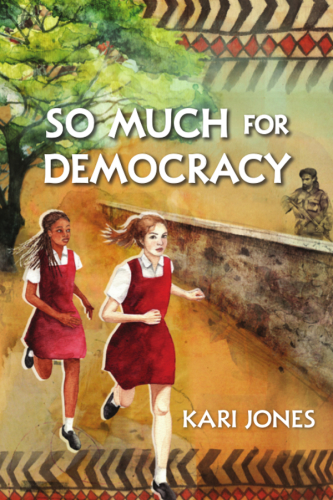
So Much for Democracy
فرمت کتاب
ebook
تاریخ انتشار
2014
Lexile Score
720
Reading Level
3
ATOS
4.3
Interest Level
4-8(MG)
نویسنده
Kari Jonesناشر
Orca Book Publishersشابک
9781459804838
کتاب های مرتبط
- اطلاعات
- نقد و بررسی
- دیدگاه کاربران
نقد و بررسی

March 1, 2014
Title notwithstanding, historical events in Ghana remain largely offstage as a 12-year-old, recently arrived from Canada, struggles to cope with her mother's descent into a nervous breakdown. Astrid's father, invited to Accra to help organize a national election, is usually away at work. This leaves her to juggle school, two younger sibs, and a stay-at-home parent whose fear of the local food, water, wildlife and people has resulted in frantic overprotectiveness, irrationally strict rules about permissible activities and increasingly violent emotional outbursts. The domestic tension comes to a head when malaria strikes brother Gordo. Then, amid the widespread turmoil caused by Flight Lt. Jerry Rawlings' coup (this is 1979, as the historical note informs readers), a soldier robs Astrid's mother at gunpoint. Otherwise, the violence and unrest are conveyed here more through radio broadcasts and overheard conversations than direct experience. Jones focuses instead on Astrid's courage, good sense and fundamental kindness in the face of her deteriorating mother's mood swings and growing distraction, the frustration of being continually kept in the dark by adults about what's going on in the larger world and the overwhelming responsibility of caring for her brother and sister. Along with hearing her Ghanaian friends' conflicting feelings about their new government, Astrid weathers her challenges at home admirably. A thought-provoking study of a family caught up in both political and domestic crises in a foreign land. (Historical fiction. 11-13)
COPYRIGHT(2014) Kirkus Reviews, ALL RIGHTS RESERVED.

May 1, 2014
Gr 5-8-Twelve-year-old Astrid's family moves from Canada to Accra, Ghana so that her father can help organize the 1979 national election. With Dad busy working, Astrid is expected to help look after younger brother Gordo and baby sister Piper amid a plethora of challenges like difficulties at school, the oppressive heat, her fearful, overprotective mother, and the looming threat of visits from local soldiers. As her mom's behavior becomes increasingly paranoid and worrisome, Astrid's strength is truly tested when Gordo contracts malaria and soldiers rob the family's home. While the political coup (led by Jerry Rawlings) plays a significant role in the family's mounting conflicts, the historical events are not center stage. The complexity of the familial relationships and escalating drama will pay off if readers are willing to commit to a slow start. Astrid is an honorable character for whom readers will root. A brief historical note is included.-Elly Schook, Jamieson Elementary School, Chicago
Copyright 2014 School Library Journal, LLC Used with permission.

April 15, 2014
Grades 4-7 Twelve-year-old Astrid moves from Canada to Ghana with her parents and younger siblings while her father assists in the nation's 1979 election (which was ultimately derailed by two coups led by military leader Jerry Rawlings, only weeks apart). The events leading up to the election, which was meant to be a democratic first for Ghana, affect Astrid at school and at home, where her mother grows increasingly protective and frightened. Meanwhile, Astrid narrates the unusual circumstances of her life in Africa, her friendships with other Ghanaian children at school, and the growing unrest in her new country. Although some characters seem two-dimensional and Astrid's mother's fears seem over the top and inexplicable, Astrid, her younger brother, and her friend Thema are well-developed young characters, and the relationships that the Ghanaians have with each other and Astrid's family are compelling. Astrid's first-person narration is appropriately childlike, and her youthful perspective is a concise, honest glimpse into an event relatively unknown in the U.S. An author's note briefly explains the historical context, which is a helpful addition to Astrid's perspective.(Reprinted with permission of Booklist, copyright 2014, American Library Association.)

























دیدگاه کاربران